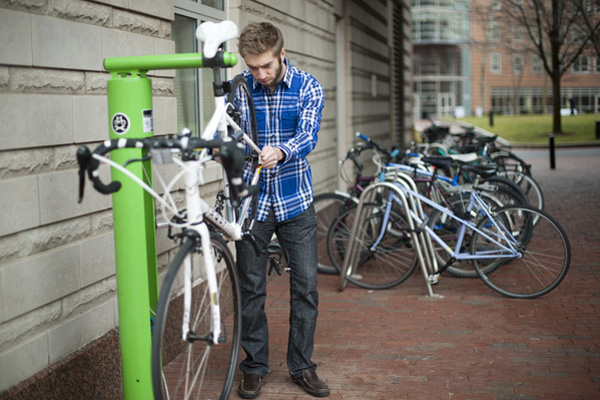Bike repairs made easy

Members of Northeastern’s cycling community now have a dedicated location to perform every-day fix-its on low tires, loose chains, and other meddlesome problems.
On Monday, Facilities staff installed a self-service bike-repair stand underneath the archway near the north tower of West Village A. The Student Government Association’s Renewable Energy Initiatives Board purchased the stand with money from the Renewable Energy Fund, to which students voluntarily contribute.
“We’re very excited about this,” said Mary Corrado, SGA’s assistant vice president for student services and chair of the Renewable Energy Initiatives Board who spearheaded the effort. “This is a low-cost way to empower bicyclists and encourage a sustainable form of transportation to and from campus.”
The four-foot-tall repair stand accommodates one bicycle at a time, and boasts tools to perform everyday fix-its and a pump to fill tires with air. A QR code on the front of the stand allows smartphone users to access maintenance instructions. SGA purchased the unit from the Minnesota-based DERO Bike Rack Co., which sells a range of commercial bike racks and maintenance stands.
Last year, SGA members sought input from the University of Oregon, the Massachusetts Institute of Technology, and Harvard University, all of which have installed similar bike repair stations. SGA will now evaluate the stand’s usage and seek user feedback through the spring and summer before exploring the potential for additional units at other campus locations.
Alex Scott, an alumnus who graduated in December and the outgoing president of the NU Cycling club, hailed the idea of bringing a bike-maintenance stand to Northeastern. Scott noted that Boston has become more bike friendly over the last five years, citing the city’s investment in bike lanes and the establishment of a bike-sharing program, Hubway. As a result, he’s noticed an increase in cyclists on campus.
The club welcomes cyclists of all abilities, Scott said, and activities range from competing in races to discussing the latest news in Boston’s bicycling scene. He said the club has collaborated with residence halls to run bike maintenance seminars, and now is in talks with SGA members about organizing similar workshops for the Northeastern community at large.
“What it comes down to is this: if you buy a bike but don’t know how to maintain it, you’re less likely to ride it,” Scott said. “People don’t realize how simple some bike maintenance can be until they know how to do it.”





